Savoring the Chaos: Issue No. 9

I knew I’d have to kill it. I just didn’t think it would be so soon.
The “it” in question? Our kitchen, if you could call it that. A thirty-foot-long limestone cave masquerading as a living space, with a cement floor, a cinderblock ceiling, and appliances lined up on the left wall like contestants in a beauty pageant where everyone had already lost.
The hob (four sad burners perched on a countertop of unknown origin) had exactly two settings: High and Almost High. Simmering required precision engineering — one inch of the pan over the flame, the rest suspended between burners. The oven lived inside a cabinet and cooked only in the top-right six inches, so you had to keep spinning dishes like a rotisserie to achieve “even.”
At the far end, a hot-water heater, a washer, and a dryer slouched against the wall like they’d survived two wars and a flood.
This was the first view you got walking into the common entry of the main house, our “mess hall.” That first week of living here was March of 2024, and the main house sat at a crisp fifty-seven degrees. Perfect for a wheel of Camembert, less perfect for humans.
Denise flew back to the States the day after we moved in, leaving me and Sully in the gîte, ferrying hot food from that cave-kitchen across the courtyard like a low-budget room service operation. Sully trotted behind me, tail high, a furry little maître d’ who took his pay in sausage, while I tried to keep the plates from cooling to “leftover” temperature before I made it to my makeshift dining room: a space with one chair, one TV, and zero charm.
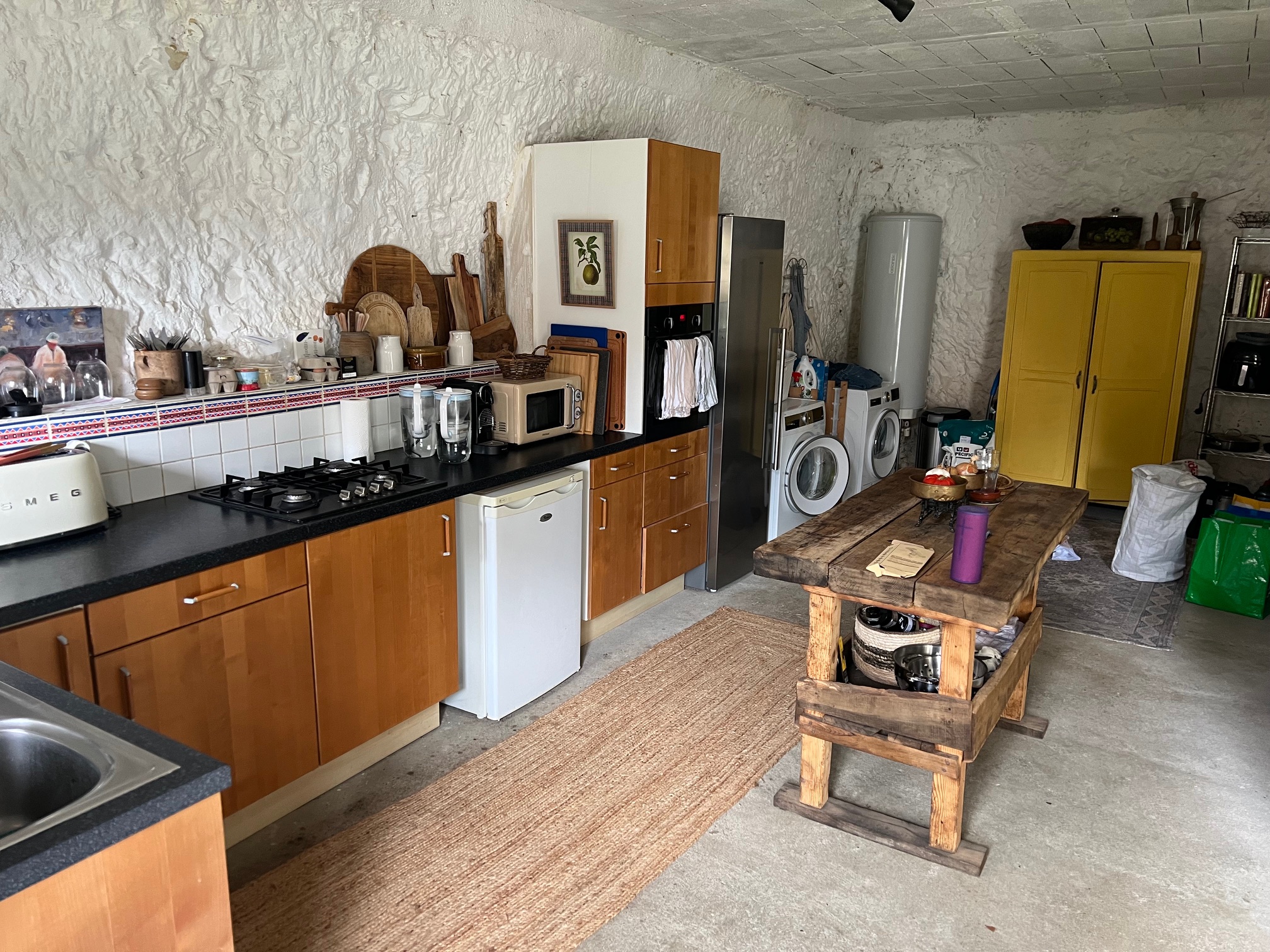
That was my first taste of life in a house in dire need of renovation.
From the start, our plan was to create a master suite upstairs. It seemed logical: fix the place we’d actually sleep first, then deal with the rest.
France had other ideas. Or, more accurately, France had its own sense of time. Renovation schedules here, like everything else, have their own head-scratching rhythm that eventually starts to make sense the more you learn about the French.
In the meantime, the kitchen and the room beside it, our future living room, greeted us with the same spartan décor: cement floors underfoot, cinderblock ceilings overhead. The cement floors were easy enough to explain. The ceilings were another story.
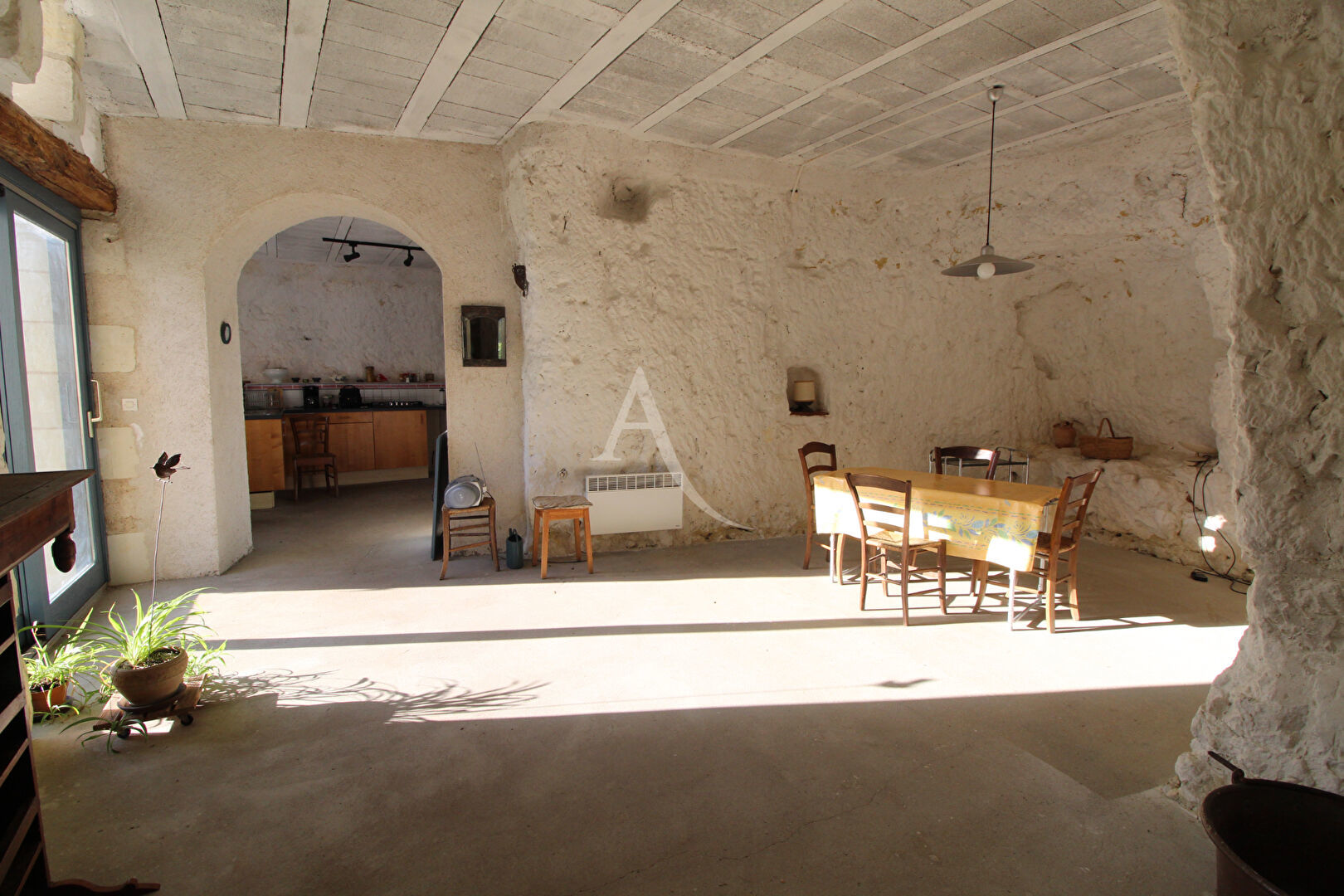
At some point, someone had stretched steel beams across the limestone cave and set cinderblocks between them — the only truly thoughtful upgrade the previous owner ever made. They were there to protect the inhabitants from the occasional wayward stone that might decide to part ways with the ceiling.
Functional? Yes. Beautiful? Not even a little.
It was the architectural version of a comb-over: you respect the effort, but you can’t look at it without wincing. The rods and blocks kept the stone above from dropping a souvenir into your wine glass during Seinfeld reruns. I could practically see it: Elaine says something snarky, plop, a one-pound limestone nugget right into the Bordeaux.
In April, our neighbor Pascal started a gorgeous renovation of the bathroom in the guest house. He’s one of those guys who measures twice, then measures again just to make sure your tile joints could double as a spirit level.
While he worked, we were busy asking every living soul in the valley how to handle the cave ceiling and floors. We even had a geologist come by to look at the caves. Our friend Naomi weighed in too. She’s a fellow American from Manhattan who’s lived in France for 25 years. She owned the Airbnb we stayed in back in 2023 when we were house-hunting here in the Loire Valley, and she also happens to own seven or eight troglodyte-style homes. She knows her caves.
This wasn’t going to be a “slap plaster on it” job. Limestone has to breathe. We’ve seen what happens when people don’t respect that. Usually, they are cheerful British folks who move in, board over the stone with plasterboard to eliminate drafts, and then six months later wonder why their house smells like a damp sock drawer. If we covered the ceiling, we’d have to keep air moving.
Then, in June, while cleaning behind the kitchen cabinets, we found what looked like mold. That word punched every panic button I’ve got. Back in California, our neighbor had black mold; two of our dogs started having seizures. We moved out. I don’t mess around with mold.
I asked Pascal to take a look. His property also has caves, so he knows the risks. He studied the spot, nodded once, and said in his calm, steady way, “We’ll fix it.” And because he’d already delivered a jewel box of a bathroom in the gîte, I believed him.
We needed a crew that could do three things: floors, ceiling, and discreet ventilation up top. We finally found one. He was a local guy with good Google reviews. I had Pascal swing over to do the smell test. Pascal knew him, of course. Pascal knows everyone. He’s lived his whole life in our little corner of the Centre-Val de Loire and might as well be the mayor. We still pinch ourselves that he lives across the street.
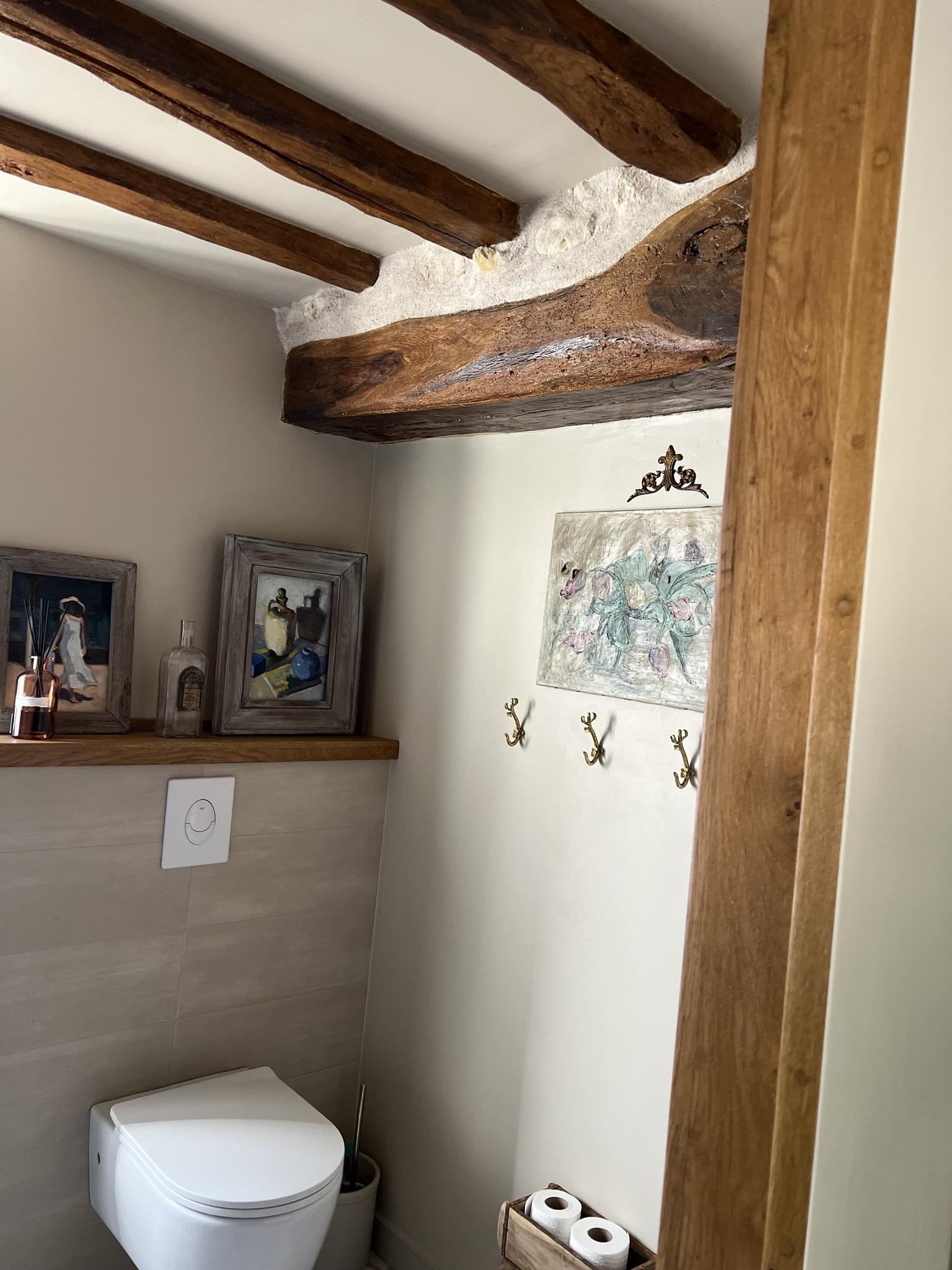
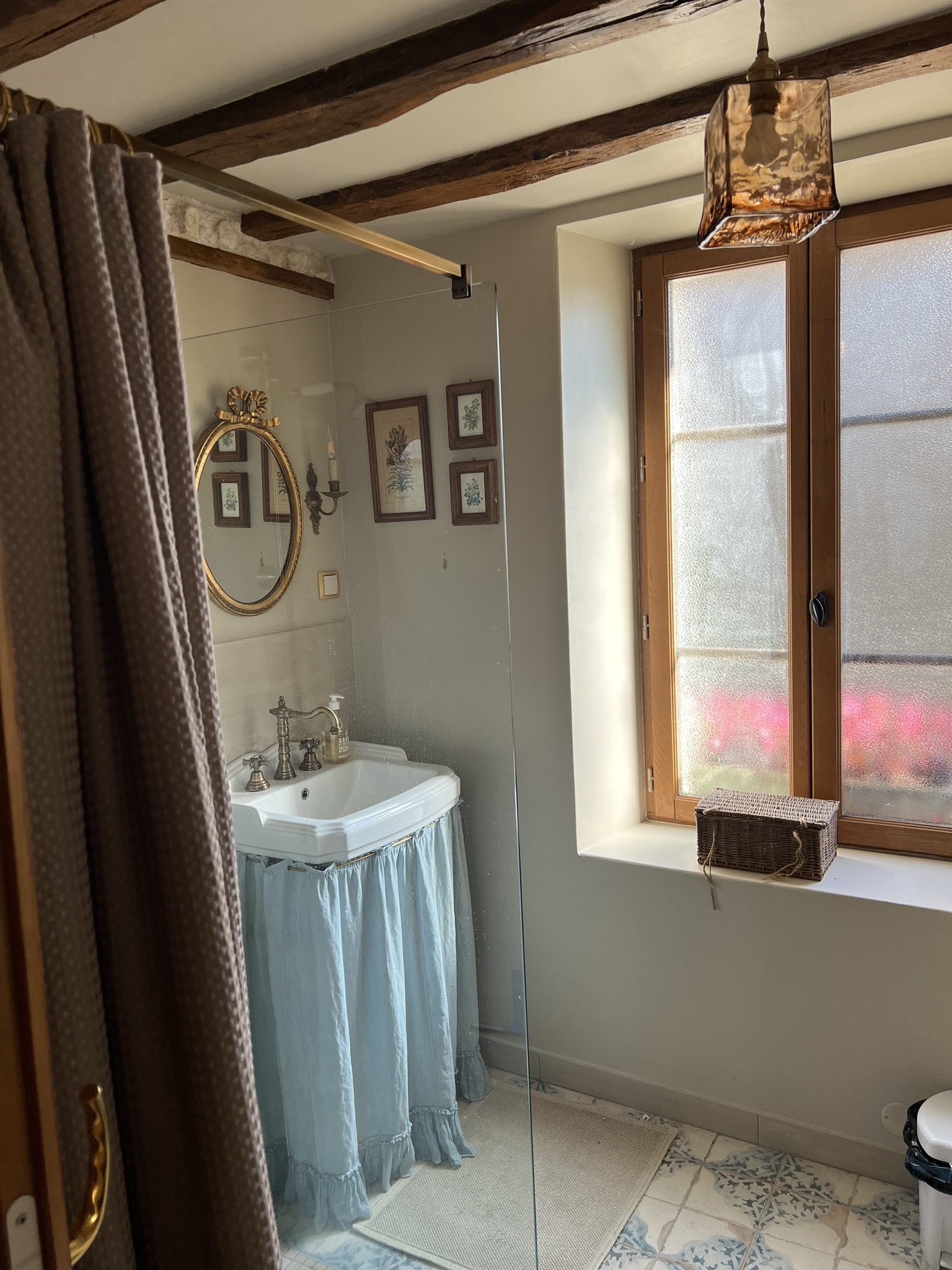
The contractor told us he had an electrician who could handle the lighting for both rooms and install the ventilation system. Perfect. We signed the devis (essentially a legally binding estimate) and paid the required 30% deposit. This was July.
They said they could start in September.
Shortly after, I hit “Buy Now” on a SMEG stove. She is a big, beautiful beast because who knows how long appliances take to arrive out here? Amazon delivered it in three days. I was thrilled… until I remembered no kitchen was going in until the floors were done. Rookie move on my part. The kitchen wasn’t getting renovated anytime soon, but we now had a $3,000 stove sitting in the garage like a stylish Italian hostage. It was like buying a doorknob and deciding to build a house around it.
September came and went with the musicality of silence. Winter crept in.
The periodic emails started:
“Any update on start date?”
“Soon.”
“Checking again on timing?”
“Soon.”
January rolled around. I finally got an unsolicited email from the contractor. He said he wanted to come by to talk to me the next day. I’d already paid him 30%, over 3,000 euros, and started practicing the speech I’d give when he canceled.
He showed up at 10:30 a.m. with a big smile on his face. (All these guys are nice, by the way, just on French time.) He and I made small talk. I handed him off to Denise because she actually had the vision; I just kept the wheels greased and the dogs fed.
“If Olympic furniture moving were a sport, we’d have medaled that day. ”
Three minutes later, D hollered:
“Paul, can you come here?”
They were in the kitchen. The contractor was still smiling. Denise had that face like she was trying to decide between laughing and strangling someone.
“He’s ready to start,” she said.
“Great,” I said.
“Today,” she said.
“Are you kidding me? Today?”
“Today. Two o’clock.”
If Olympic furniture moving were a sport, we’d have medaled that day. We had three hours to empty a room the size of a small tennis court: heavy French sideboards built like they’d survived Napoleon, a sofa that had absorbed the weight of every bad decision I’ve made in life, boxes, tables, lamps, rugs — all of it — into the garage or wherever it would fit. The garage was blocked by the almighty SMEG, so we had to play appliance Tetris to get anything past it. At one point I swear Sully sighed, as if to say, You people.
They started at two. The guys were good — fast, careful, and mercifully quiet when they saw my thousand-yard stare. The ceiling went first, then we brought in the electrician to tuck little vents into the new drop so the cave could breathe. That dance lasted through the end of March. By then, we had a ceiling I didn’t hate, but no floor, and a bare ceiling that still needed paint.
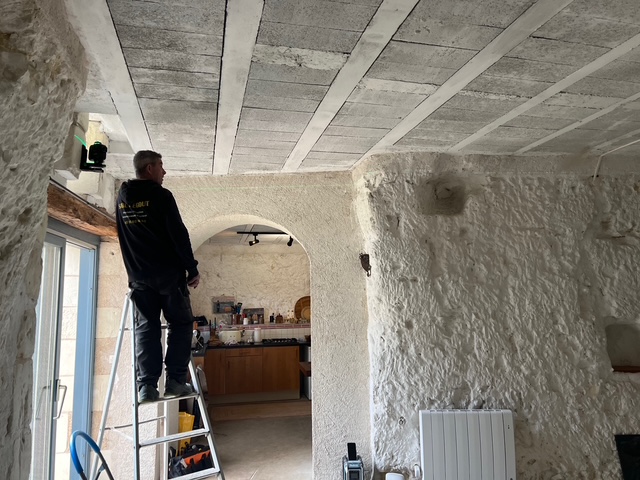
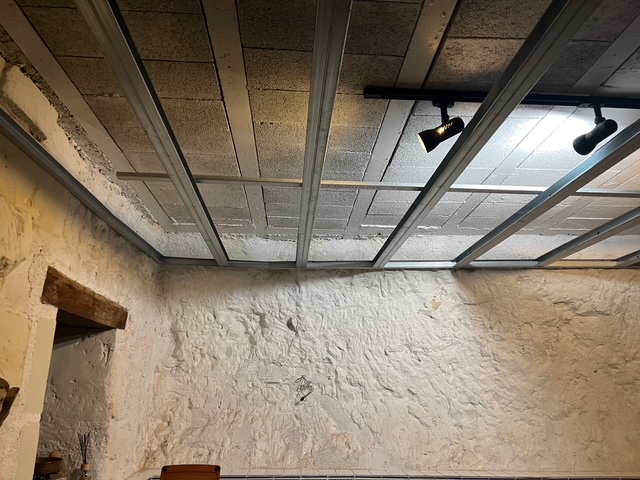
When I asked about the flooring, the contractor said he’d be back at the end of April. End of April? We had friends arriving in May. I needed a floor and a kitchen. I was not welcoming guests into a room that looked like a Cold War bunker with aspirations.
You can’t start sooner?” I asked.
“Non, non,” he said, palms up. This is the universal French signal that your problem is now a calendar issue.
I stewed for a day, then remembered: the only thing the French love more than a three-hour lunch is saving money. I emailed a “performance plan”:
“If you finish in two weeks, I’ll give you an extra 1,000 euros. If you finish by the end of April, 500.”
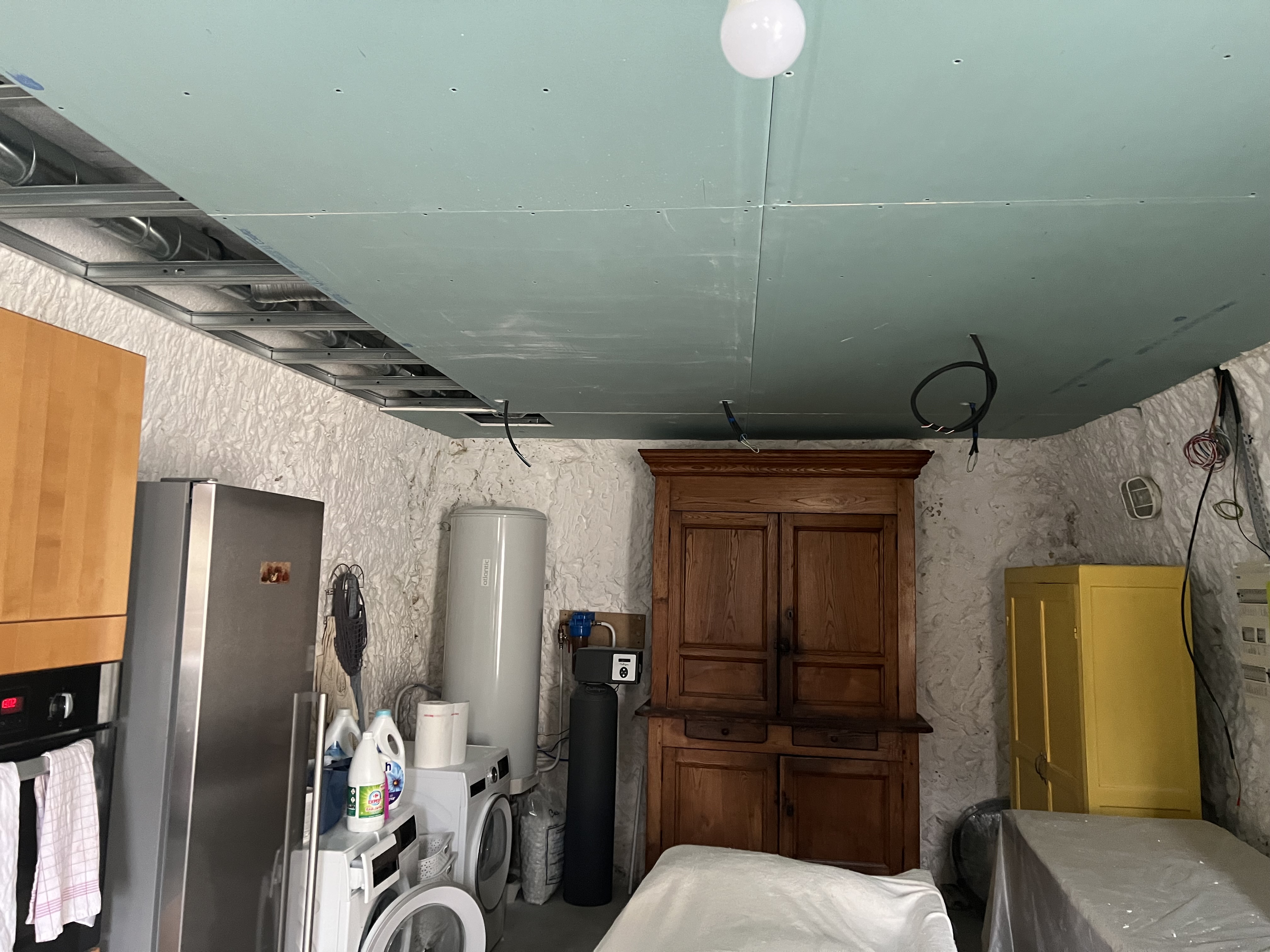
He replied the next morning: “We start in two days.”
I’m not saying money talks. I’m saying it sings.
The day before his crew arrived, he swung by to walk the site one more time. “Ah, and you must remove the kitchen,” he said, as casually as if he were mentioning we were out of milk. “All of it.”
Denise walked through just then, caught the tail end, and froze. “I’m not ready for this.”
“It’s happening, babe,” I said. This is the kind of sentence you only get to say once if you want to stay married, even if we aren’t technically married.
Pascal came that afternoon with his surgeon’s steadiness, and we started demo like we’d trained for it. Denise was gleefully swinging a sledgehammer like she’d just landed a starring role on HGTV. Pascal even showed her the satisfying way to pull back plasterboard after punching holes in it.
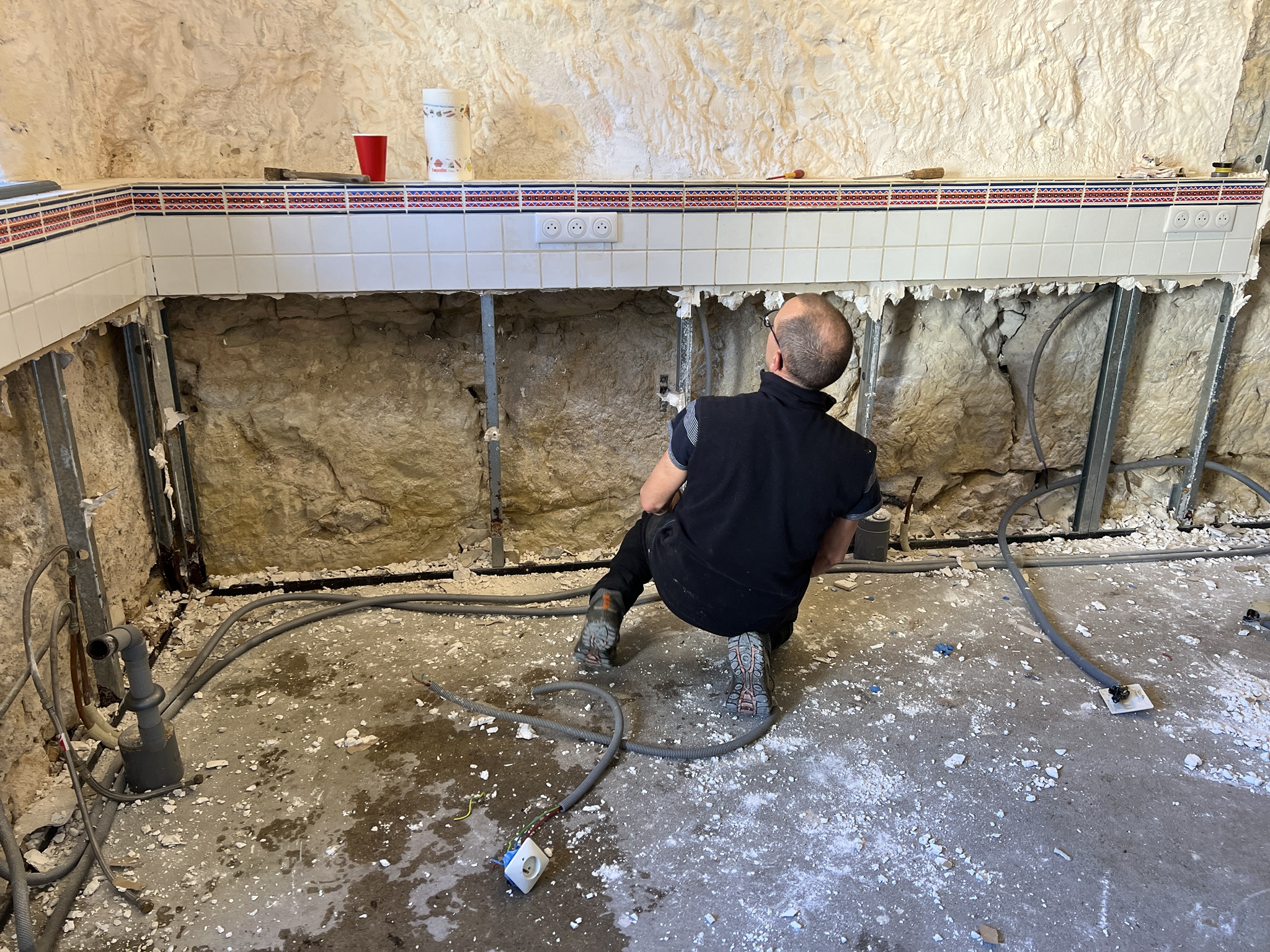
Cabinets out. Countertops off. Fridge unhooked and rolled to the gîte. Behind the counters we found real mold… and saltpeter leaching out of the stone. Saltpeter (man, I am immature) is one of those things you hear about when you’re twelve and never expect to see, and even when you do, you’re still not entirely sure what it is. Denise cleaned, scraped, treated, and let it breathe.
Then came six weeks of no-kitchen life. We washed dishes in the gîte bathroom sink. I cooked on the grill, an air fryer, and a hot plate perched on a folding table like a college freshman who’d gotten lost and ended up in rural France.
Pascal framed the new kitchen like a watchmaker: precise, square, solid. Our banker’s husband, Valentine, a master carpenter because of course he is, built the cabinets off-site and delivered them like a proud uncle.
Together, Valentine and I deadlifted the 400-pound SMEG into place. I’m not a spring chicken, and he may only weigh 150 pounds, but he’s thirty years younger. We both made the same sound when it landed, a kind of half-groan, half-laugh that said: We live here now.
Three days before our friends arrived, thanks to Pascal, we had running water, real cabinets, a floor I wanted to pet, and a stove that heated evenly in every quadrant like a miracle. The backsplash? That would have to wait. The tiles were on backorder… France.
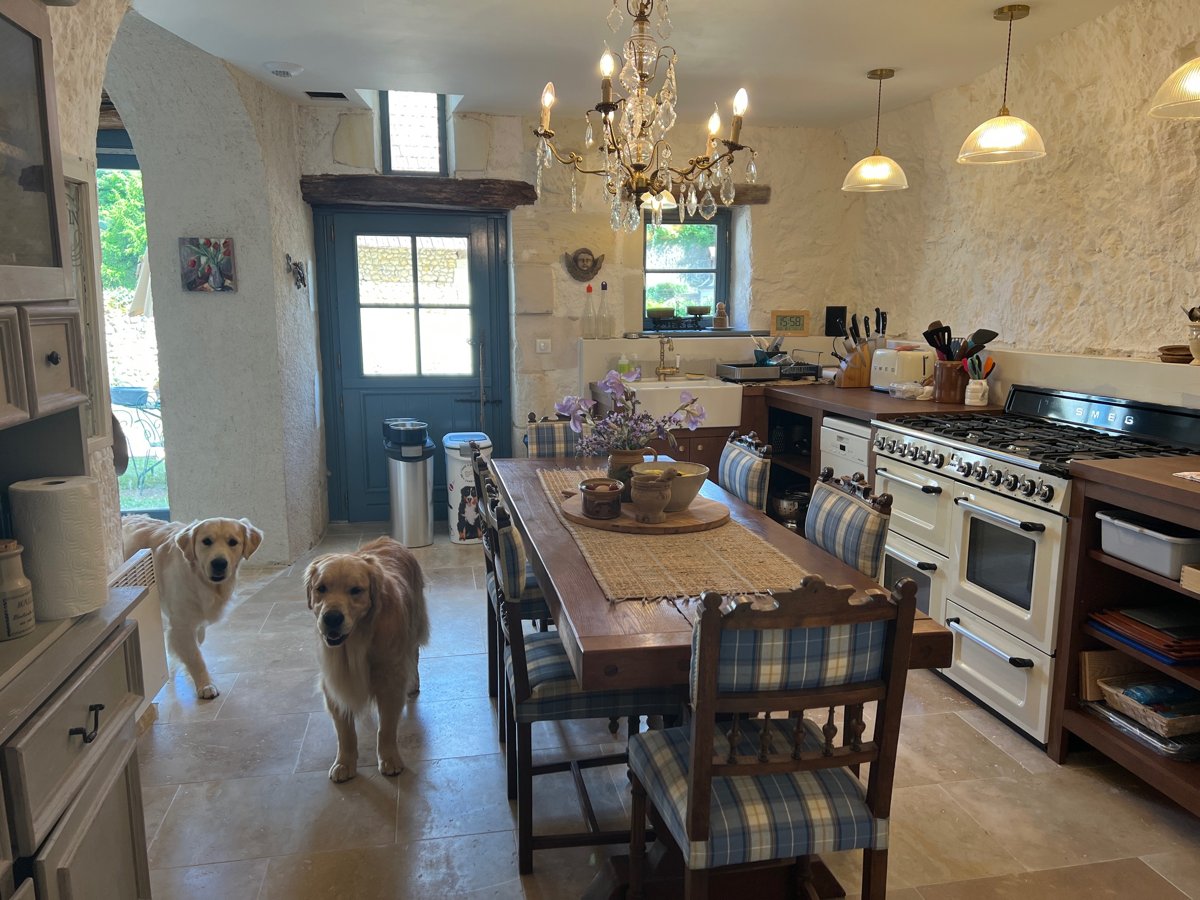
France could keep the tiles...I had a kitchen again, and nothing was going to keep me from firing up that stove.
That first dinner we made inside — seared chicken, pan sauce that didn’t scorch, vegetables roasted evenly (top-left, bottom-right, all the zones) tasted like victory. Or maybe just like a proper oven. At that point, it was the same thing.
People ask me why we didn’t just do the kitchen first. I laugh. In houses like this, nothing is “first.” Everything is connected. You fix one thing, and something else starts complaining. The ceiling had to be sorted so rocks didn’t join us for dessert. The cave had to breathe so we didn’t recreate our California mold trauma. The floor had to go in before the cabinets, so we weren’t cutting around things like amateur magicians. And contractors here operate on some unknown, possibly Gaulish, calendar, so your best tool is patience… followed closely by a small bag of incentives.
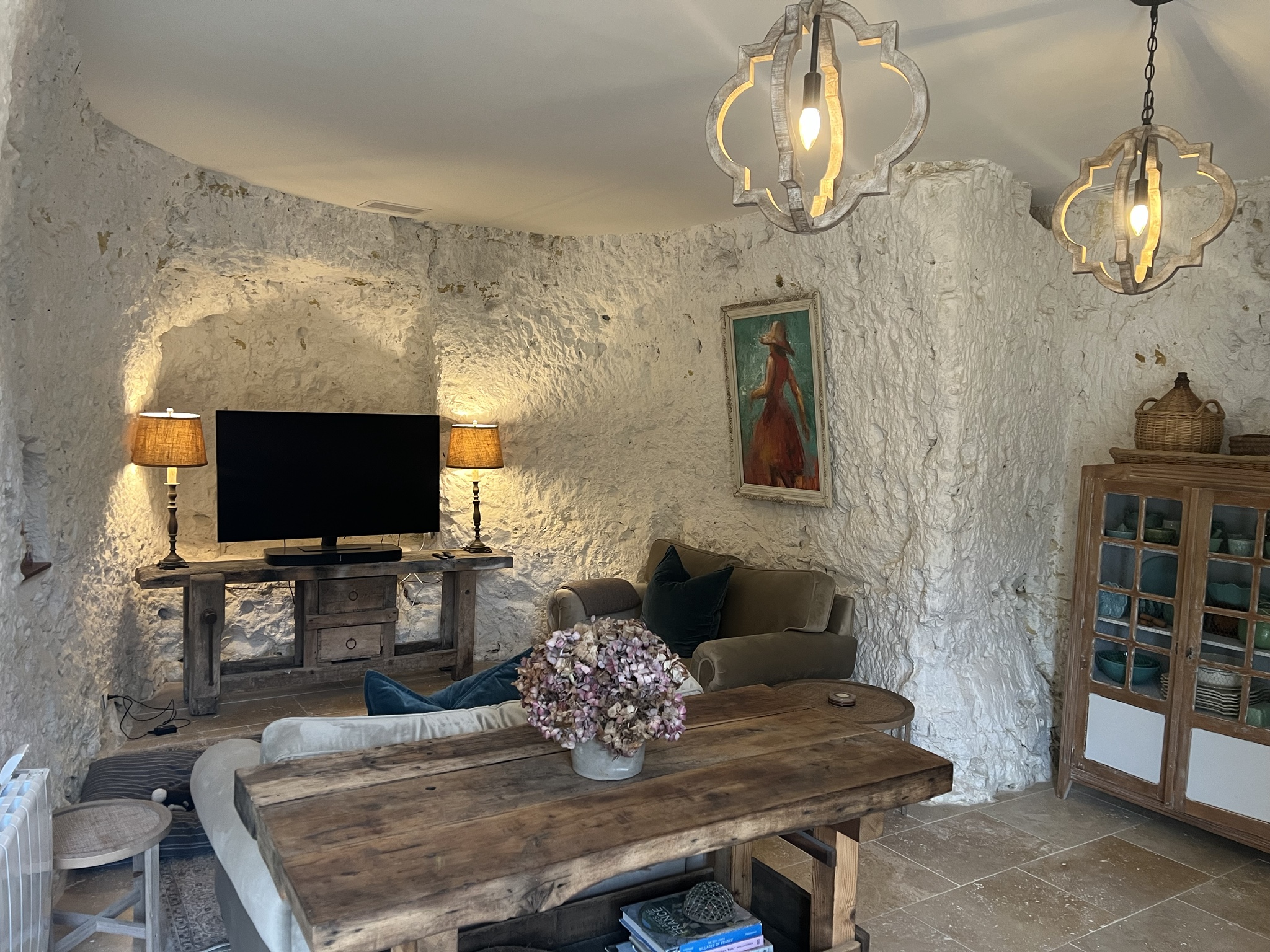
I look around now and see the shape of Denise’s vision taking hold: the long room is warm without being precious, the ceiling is quiet, the floor grounds everything, the appliances work like they believe in us.
We even added a wall in the middle to create a pantry/laundry room to hide the appliances. The dogs still sprawl out on the cool spots and sigh in approval.
We’re a backsplash away from “finished.” Pascal actually starts on it tomorrow, August 11, and cabinet curtains that his wife, Katia, is sewing. Then there’s the upstairs. And the driveway. And, okay, several other things. But this room no longer feels like a dare. It feels like home.
We don’t have the hard skills. Not really. I can swing a hammer and lift a stove if my pride is on the line, but I’m not wiring anything, and you don’t want me tiling. What we have is stubbornness, high EQ, Denise’s eye, and a circuit of characters who keep showing up at just the right moment: Pascal with his surgeon’s calm, Valentine with his carpenter’s grin, Naomi materializing to translate and head off bad ideas before they can breed, and Florent, the wayward son of the quarry, arriving with stones for the driveway on a timetable known only to him and maybe the moon. More on that another time…
That’s the rhythm here. You plan. You wait. You get the surprise knock at 10:30 a.m. and the line — “We start at two.” — and then you sprint. You bribe a little when it counts. You wash your dinner plates in a bathroom sink and still find something to laugh about.
And then, on a random Tuesday three days before company, you sit down in your not-quite-finished kitchen, take a bite of chicken that cooked evenly on the first try, and you realize you wouldn’t trade any of it. Not even the SMEG deadlift.
If you want the dream, you take the chaos that comes with it. And if you hang around long enough, the chaos starts to taste a lot like dinner.
The Quirky Bit
The French Love Affair with Kitsch
Somewhere between their obsession with haute cuisine and their reverence for Jerry Lewis (still inexplicable to me), the French have a secret love for kitsch. Not ironic kitsch, but sincere, wide-eyed, heart-on-the-sleeve kitsch. Which brings me to La Plage, a restaurant in Montrichard sitting right on the sandy banks of the Cher River.
It bills itself as a BBQ joint. You smell the smokers before you see them. Wagon wheels straight out of Texas dot the patio. The menu boasts “pulled BBQ pork sandwiches.” But because this is France, the “sandwich” arrives as shredded pork with cheese stuffed inside a pastry, topped with crispy onion straws. It’s equal parts barbecue and boulangerie — like Memphis and Montmartre had a baby.
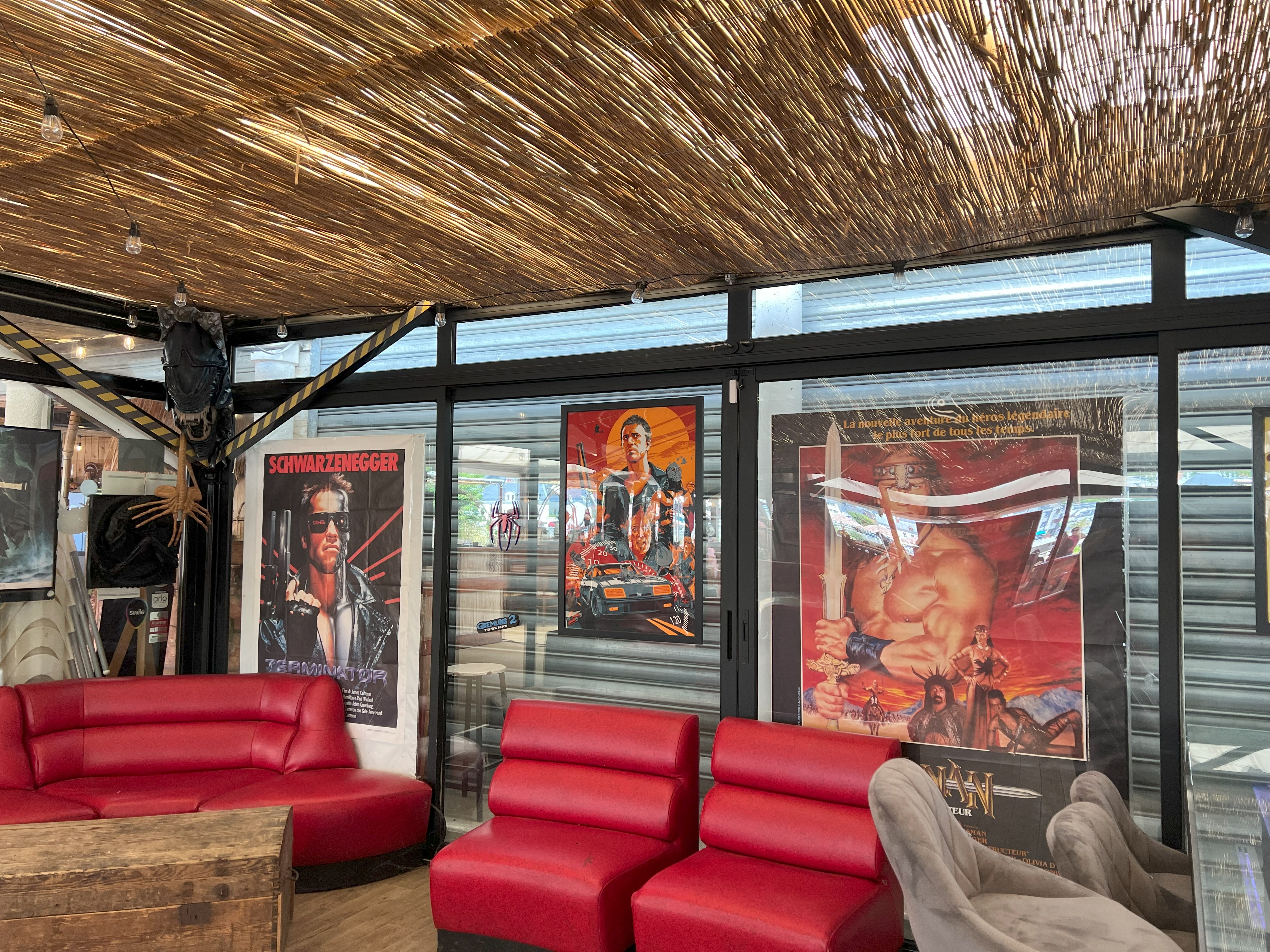
Step inside, and it only gets better. La Plage has two massive party rooms that double as shrines to American pop culture. Not the cool, curated kind, but the glorious, unapologetic, ‘80s VHS rental kind.
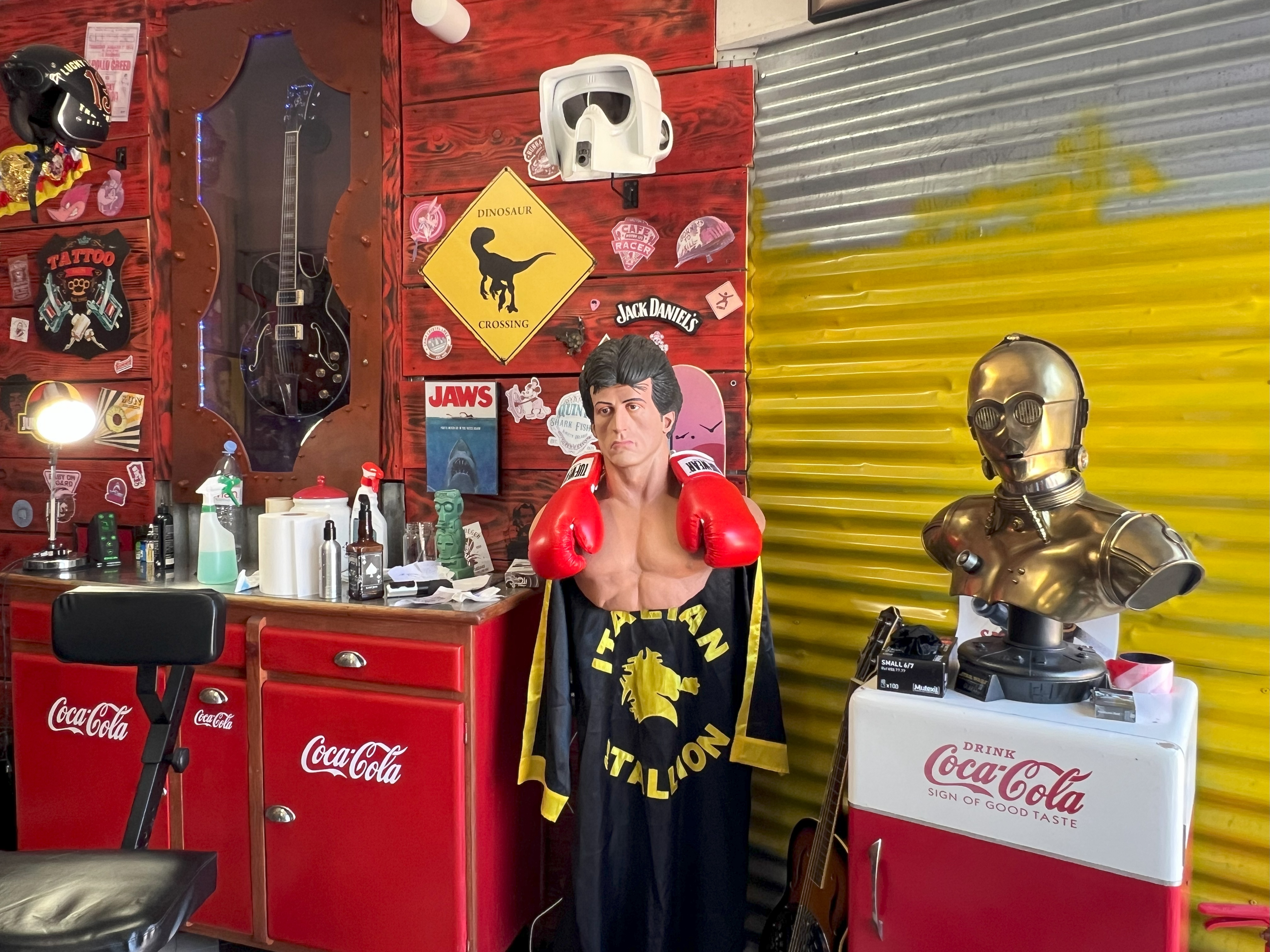
One room greets you with a Rocky in full Italian Stallion regalia standing guard next to C-3PO, who is inexplicably manning a Coca-Cola mini fridge. Darth Vader looms in the corner. Posters of Jaws, Rambo, Back to the Future, and Terminator line the walls. There’s King Kong mid-roar, Indiana Jones dodging snakes, and Schwarzenegger holding a shotgun with the same expression you’d have if someone double-dipped in the guacamole.
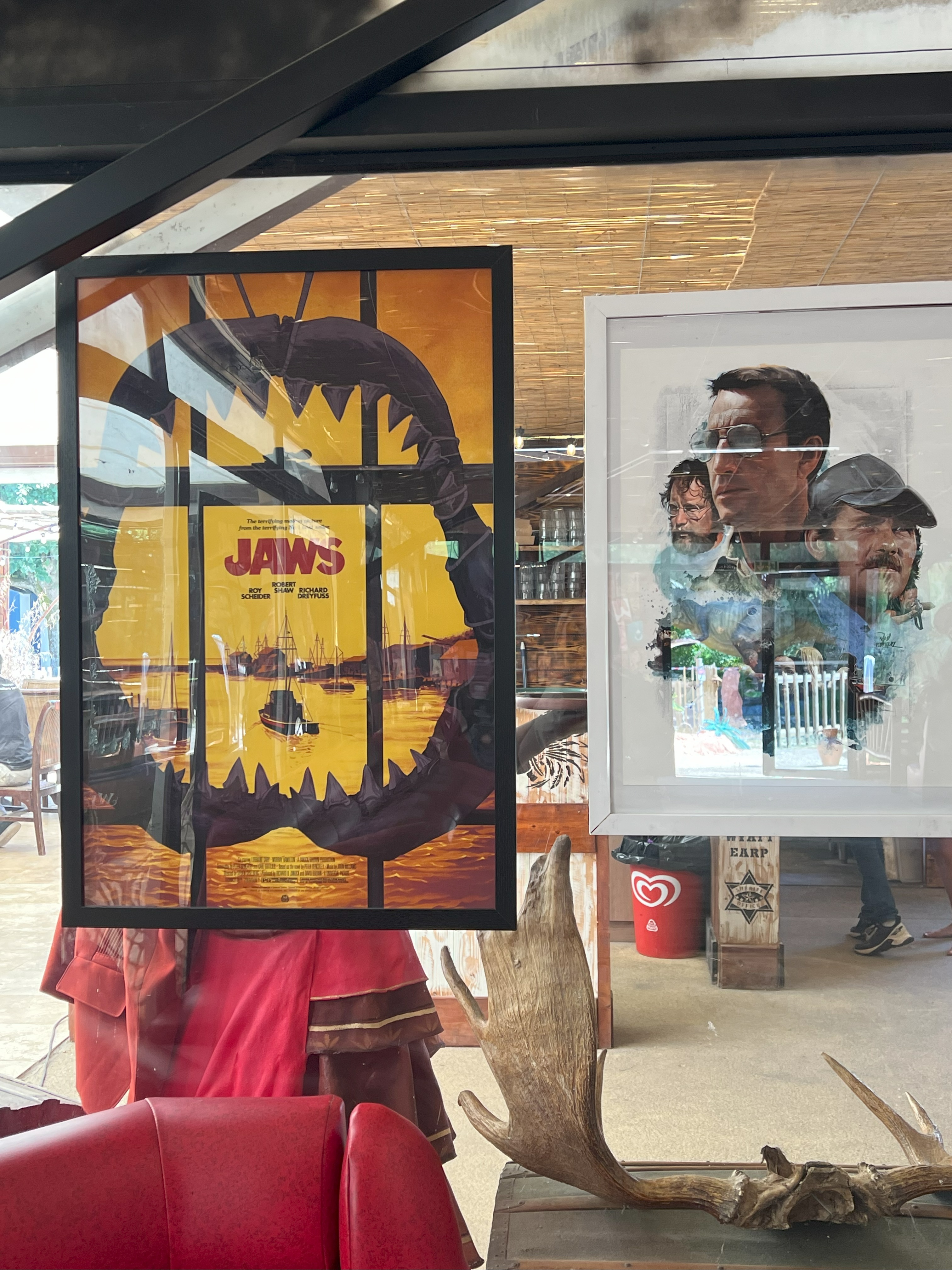
It’s chaotic. It’s over the top. And it’s perfect.
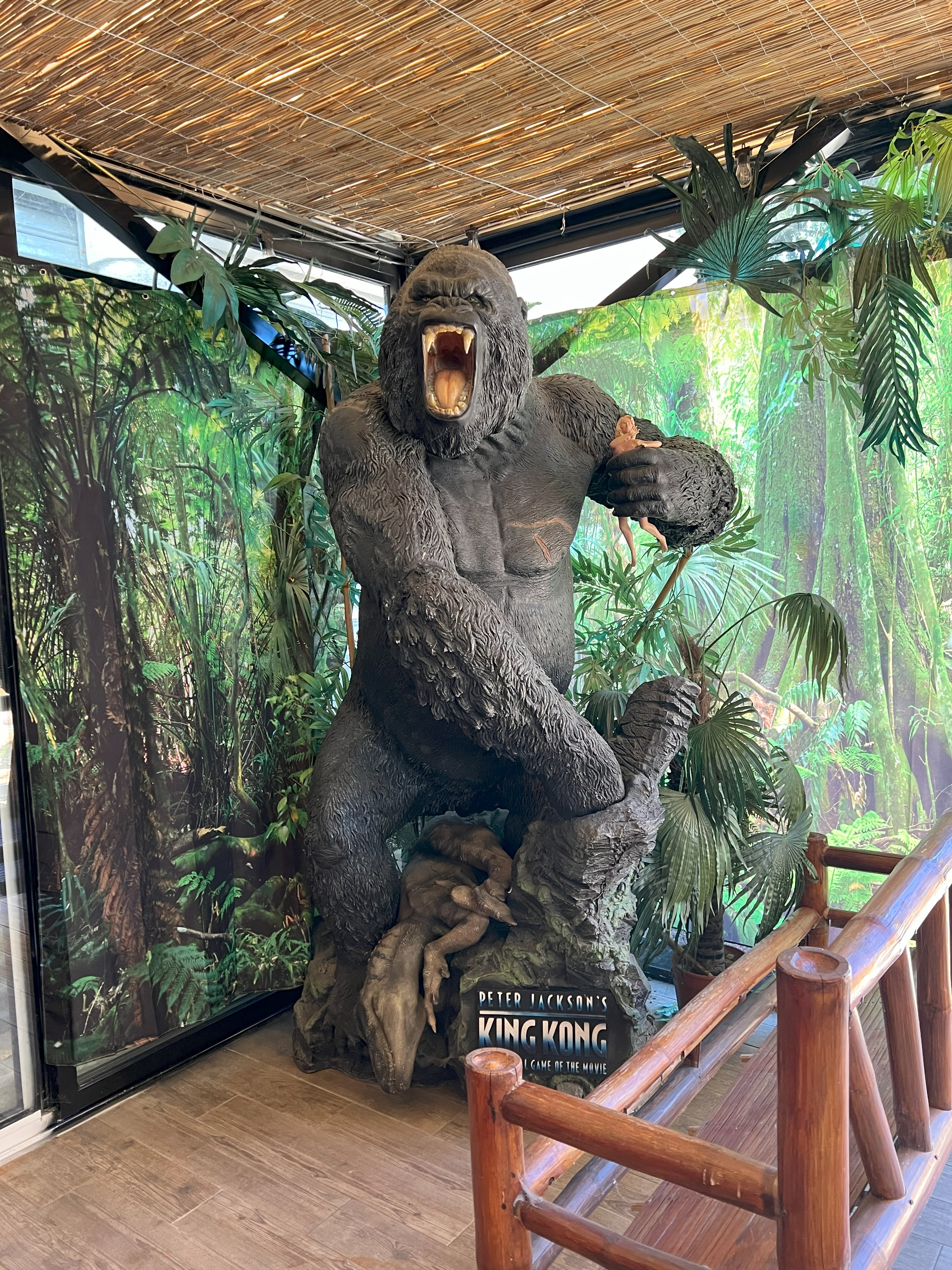
Because here’s the thing, when the French go kitsch, they go all in. No half-measures, no muted irony. Just pure, enthusiastic homage. And somehow, in the middle of the Loire Valley, eating BBQ pork in a pastry under the watchful eye of Rocky Balboa, you realize you’re not in America… but you’re not not in America either.
Until next time.
Thanks for subscribing and thanks for reading.
Paul
P.S. Oh — and if you’re curious about what moving to France is really like, I did finally put it all in a book. Get Frenched is part guide, part comedy of errors, and all true. It’s at WeGotFrenched.com.

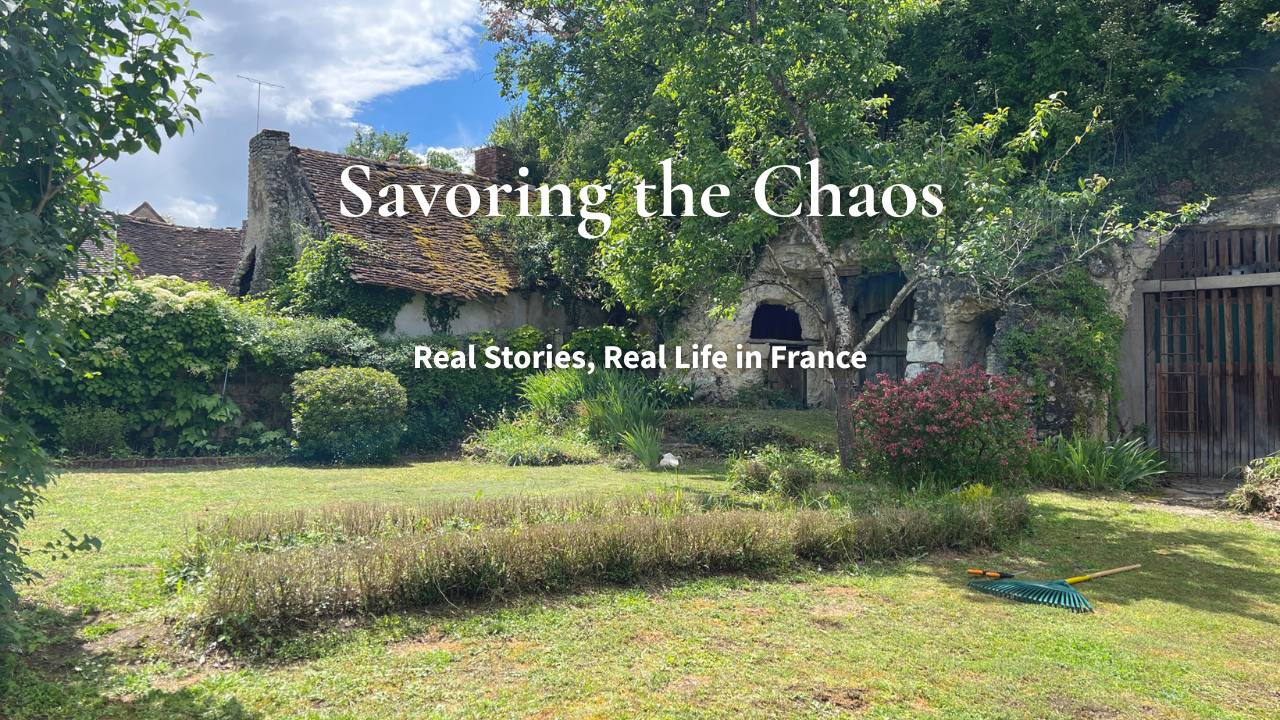
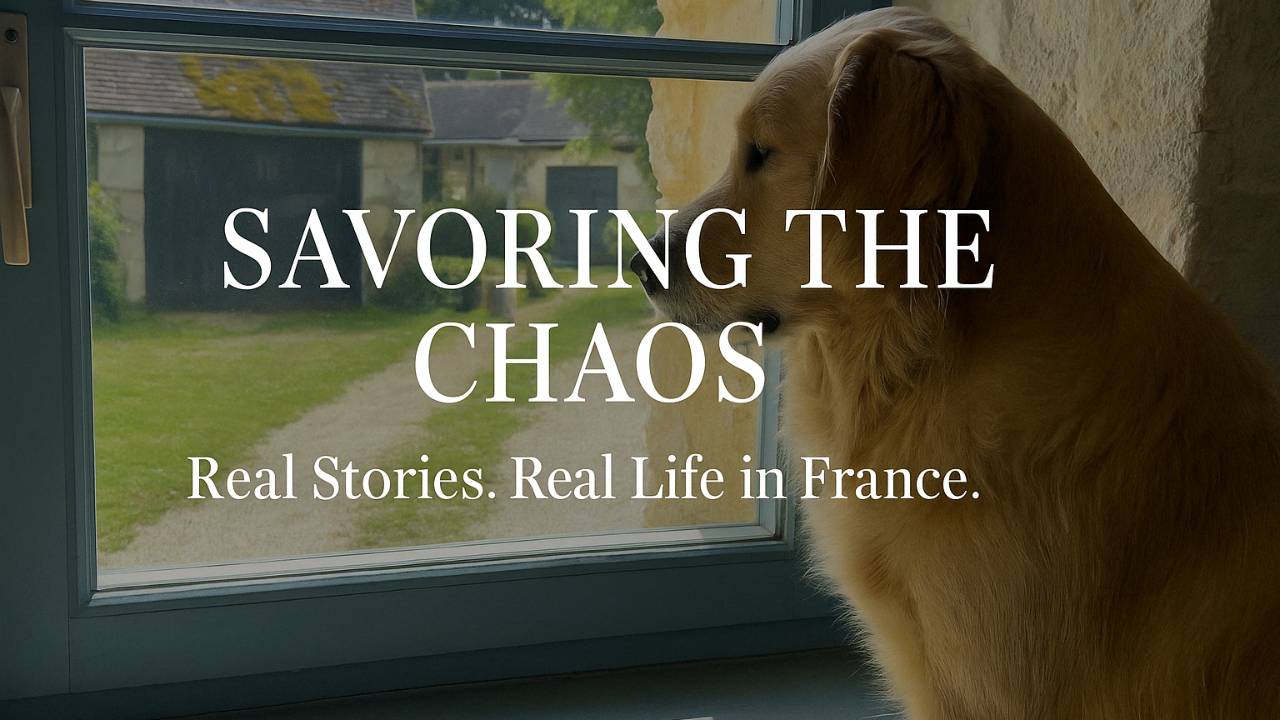

Responses